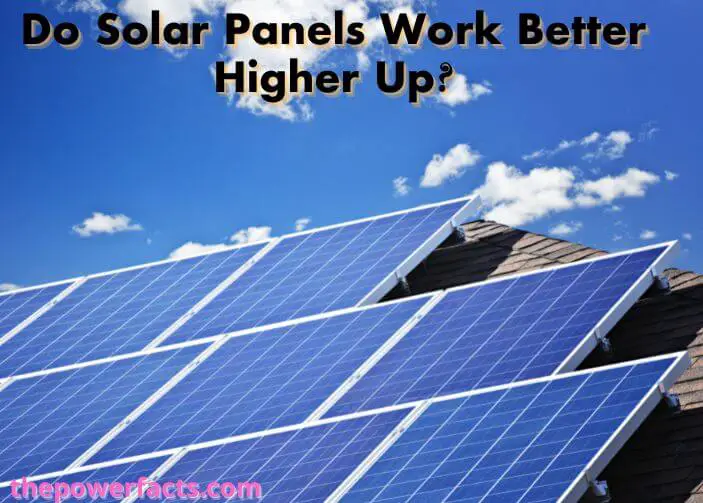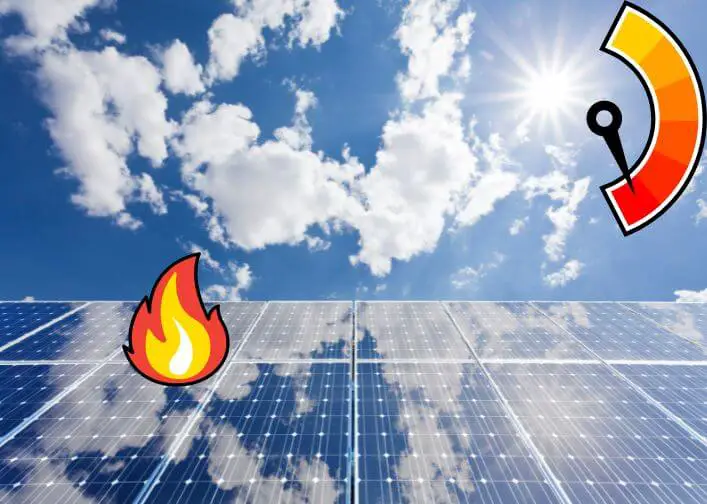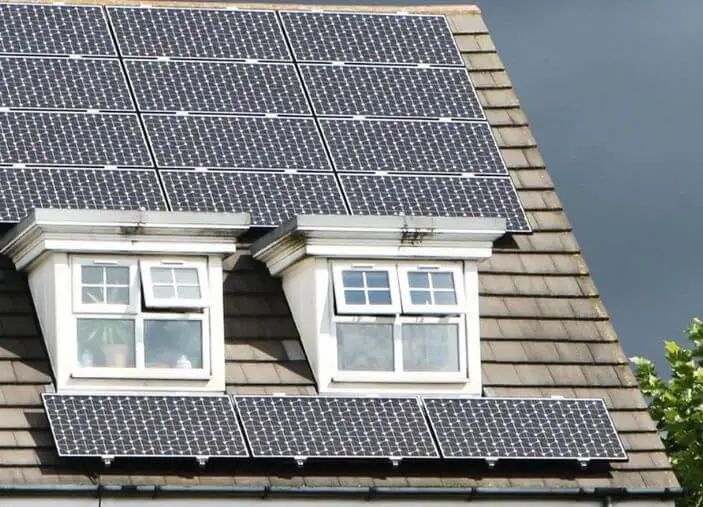Solar panels are designed to absorb sunlight and convert it into electricity. The amount of electricity produced by a solar panel depends on the intensity of the sunlight it receives. In general, solar panels work better when they are placed in an area that receives direct sunlight for most of the day.

However, solar panels can also produce electricity when they are placed in an area that receives indirect sunlight or partial shade.
Are you considering installing solar panels on your home or business? If so, you may be wondering if it matters how high up off the ground they are. Does elevation make a difference in how well solar panels work?
The answer is yes, to a certain extent. Solar panels will always work best when they are directly in sunlight, and elevated panels are more likely to be in direct sunlight than those at ground level. This is especially true if your area has trees or other buildings that cast shadows on lower-level panels.
However, there are also some drawbacks to higher solar panels. They can be more difficult and expensive to install, and they may not produce as much power as you expect if your roof isn’t oriented perfectly towards the sun. In general, though, higher solar panels will perform better than lower ones.
Effect of Altitude on Solar Panels
Solar panels are a great way to generate renewable energy, but their effectiveness can be affected by altitude. The higher the altitude, the less sunlight there is to power the solar panels. This is because the atmosphere filters out some of the sun’s rays as they travel through it.
So, if you live in a high-altitude area, your solar panels may not be as effective as they could be. There are a few things you can do to offset this effect, though.
First: you can make sure your solar panels are tilted at an angle that maximizes their exposure to sunlight.
Second: you can invest in more powerful solar panels that are designed for high-altitude areas. And third, you can use reflective materials to help direct more sunlight onto your panel’s surface. If you live in a high-altitude area and want to get the most out of your solar panels, following these tips should help optimize their performance.
Do Solar Panels Absorb Heat?
Solar panels are designed to absorb sunlight and convert it into electricity. However, they can also absorb heat from the sun. This can cause the panels to become hot and reduce their efficiency.
There are a few ways to prevent this from happening.
One way is to use an anti-reflective coating on the solar panels. This coating helps to reflect some of the heat away from the panel, keeping it cooler.
Another way is to use a cooling system that circulated water or air around the panel. This helps to remove excess heat and keep the panel operating at its optimal temperature.
Solar panels are a great way to generate electricity, but it’s important to keep them cool in order to maintain their efficiency.
By using an anti-reflective coating or cooling system, you can help your solar panels operate at their best.
Best Conditions for Solar Panels
The sun is the ultimate source of energy for our planet. Solar panels are devices that convert sunlight into electricity. They are composed of solar cells that capture the sunlight and convert it into DC (direct current) electricity.
Solar panels need to be installed in a location where they will receive direct sunlight for the majority of the day. And it must be installed by a qualified electrician. The angle at which the sun hits the Earth changes throughout the year, so it’s important to have your solar panels installed at an angle that will maximize their exposure to sunlight. In addition, solar panels should be kept free of debris and snow so that they can absorb as much light as possible.
If you’re considering installing solar panels, make sure to do your research and find a reputable company to install them for you. The installation process can take up to several weeks, depending on the workload of the municipality and the completeness of your application. With proper care and maintenance, solar panels can provide clean, renewable energy for years to come!
Why Does Temperature Affect Solar Panels?

As the weather gets colder, you may notice that your solar panels aren’t producing as much energy as they normally do. That’s because the temperature can have a big impact on solar panel performance. Solar panels are made of semiconductor materials like silicon, and their output is directly proportional to the amount of sunlight they receive.
But when it’s cold outside, those same materials don’t work as well. The electrons in the silicon become less active, which means they can’t absorb and convert sunlight into electricity as efficiently. So how much does temperature really affect solar panels?
It depends on the type of panel and the material it’s made of, but generally speaking, a drop in temperature of 10 degrees Celsius can lead to a decrease in power output of about 15%. So if your panels are usually producing 1 kilowatt (kW) of power at 25 degrees Celsius, you might only get 850 watts at 15 degrees Celsius. Of course, this all varies depending on the conditions.
If it’s a sunny day, your panels will still produce more power than on a cloudy day at the same temperature. And if it’s really cold (-10 degrees Celsius or below), most types of solar panels will actually stop working entirely until things warm up again. So if you live in a climate with very cold winters, you might want to consider installing some kind of heater for your solar panels to prevent them from shutting down completely during those months.
Overall, the temperature is just one factor that can influence how well solar panels perform. But if you’re noticing a drop in output during cooler weather, now you know why!
Can Solar Panels Get Too Hot?
Solar panels are designed to withstand high temperatures, but there is a limit to how hot they can get. If the temperature of the panel gets too high, it can start to degrade the material and reduce its efficiency. There are a few things that can cause solar panels to overheat, including:
| Direct sunlight | If the sun is directly shining on the panel, it will absorb more heat and could start to overheat. |
| Ambient temperature | If it’s already hot outside, the panel will absorb more heat from the air and could start to overheat. |
| Poor ventilation | If the panel isn’t able to dissipate heat properly, it could start to overheat. |
If you think your solar panel might be getting too hot, you can check the temperature of the cells with an infrared thermometer. The ideal cell temperature is between 25-45 degrees Celsius (77-113 degrees Fahrenheit). If the cell temperature starts to exceed this range, it’s time to take action to prevent further damage.
Heat Generated from Solar Panels
Solar panels are an increasingly popular way to generate electricity, but how do they work? Solar panels convert sunlight into electricity. They do this by using semiconductors made of materials like silicon.
When sunlight hits the solar panel, it knocks electrons loose from the silicon atoms. These electrons flow through the material to metal contacts on the sides of the solar panel. This creates an electric current that can be harnessed to power homes and businesses.
Solar panels are most efficient when they are directly facing the sun. However, they can still generate electricity on cloudy days or when they are not in direct sunlight. The amount of electricity generated by a solar panel depends on several factors, including its size, the angle at which it is tilted toward the sun, and the intensity of sunlight hitting it.
Solar panels generate electricity without emitting any greenhouse gases, making them a clean source of energy. They also have a very small carbon footprint since manufacturing them does not require burning fossil fuels. In fact, producing one kilowatt-hour (kWh) of electricity from solar panels generates about 0.11 pounds (50 grams) of carbon dioxide equivalent (CO2e).
Do Solar Panels Work on Cloudy Days?
Solar panels are designed to work in all weather conditions, including cloudy days. However, they will produce less electricity on a cloudy day than on a sunny day. The amount of power produced by a solar panel depends on the intensity of the sunlight that hits it.
Cloudy days have lower intensity sunlight, which means that solar panels will produce less power. Solar panels can be damaged by heavy rains or hail, so it is important to have a plan in place to protect them.

Frequently Asked Question
Does Altitude Affect Solar Panel Efficiency?
Solar panels are most efficient when clean and directly facing the sun. However, the angle of the sun relative to the panel also affects efficiency. In general, solar panels will produce more electricity when they are perpendicular to the sun’s rays.
The amount of sunlight that hits a given location on Earth changes throughout the day and throughout the year. The angle of incidence also changes as the sun moves across the sky. All of these factors affect how much electricity a solar panel can generate.
Altitude does affect solar panel efficiency because it changes the angle at which sunlight hits the panel. The higher up you are, the more direct sunlight you will receive. This means that solar panels located at high altitudes will be more efficient than those at lower altitudes.
Additionally, altitude also affects temperature. The higher up you are, the colder it is likely to be. Colder temperatures can decrease solar panel efficiency because semiconductors work best within a certain temperature range too high or low and their output begins to fall off significantly.
How Do You Maximize the Efficiency of a Solar Panel?
Solar panels are a great way to save money on your energy bill, but they can be even more effective if you take some measures to maximize their efficiency. Here are a few tips:
| Tips | Description |
| Keep them clean | Dust and debris can build up on solar panels, making them less effective at converting sunlight into electrical power. Be sure to keep them clean by hosing them down or wiping them with a soft cloth. |
| Avoid shading | If possible, position your solar panels in an area where they will not be shaded by trees or other objects during the day. This will ensure that they receive the maximum amount of sunlight possible and can generate as much electricity as possible. |
| Use a tracking system | Some solar panel systems come with a tracking system that allows the panels to follow the sun throughout the day, increasing their effectiveness. If your system does not have this feature, you may want to consider adding one. |
Would Solar Panels Work Better Closer to the Sun?
No, solar panels would not work better closer to the sun. In fact, they would likely work less effectively because the sun’s rays would be more concentrated and intense. Solar panels rely on photovoltaic cells to convert sunlight into electricity, and these cells are most efficient when they receive diffuse light rather than direct sunlight.
So while it might seem counterintuitive, solar panels actually work best when they’re not too close to the sun.
Conclusion
Solar panels are more efficient when they are placed higher up, as they can absorb more sunlight. This is because the sun’s rays are more direct when the panels are higher up, and they can therefore absorb more energy. Solar panels can be placed on rooftops or on the ground, but their efficiency will always be greater when they are closer to the sun.